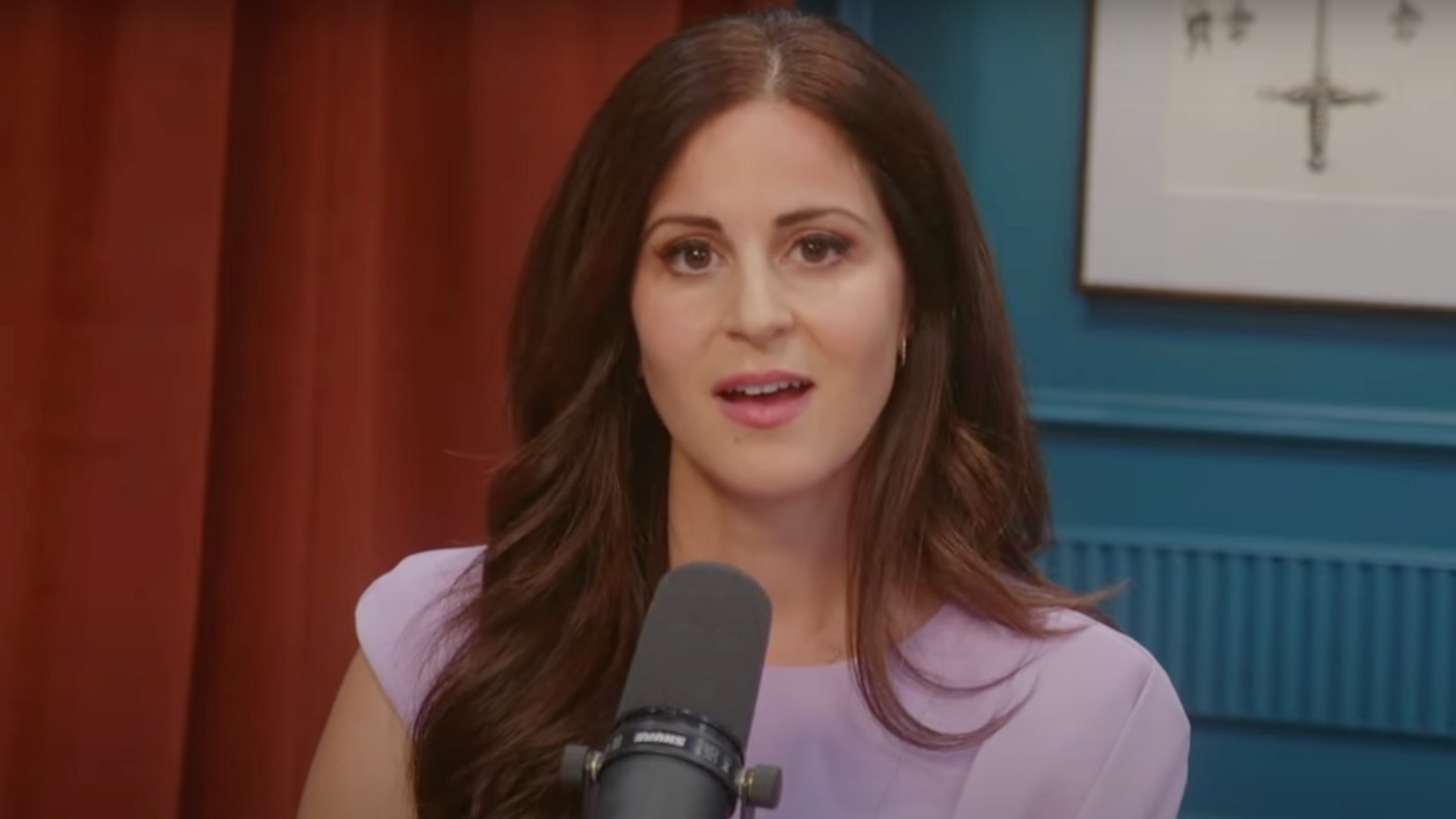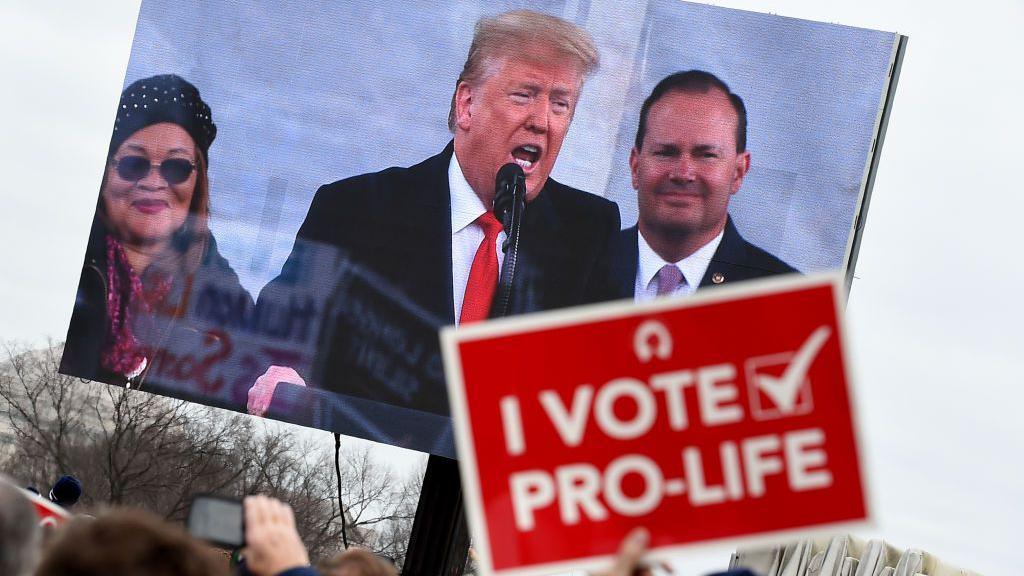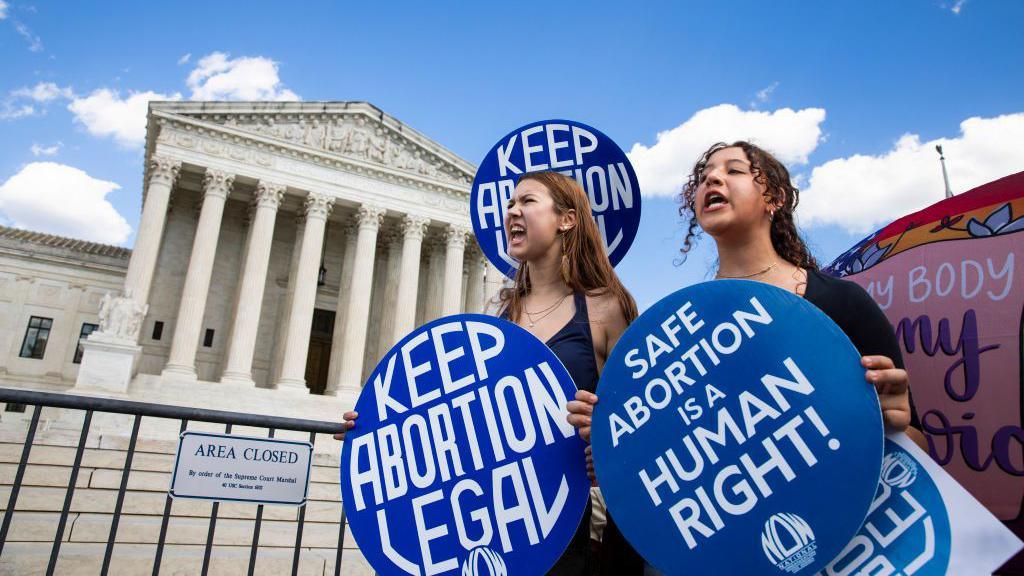The anti-abortion activist urging followers not to support Trump

Lila Rose told her followers last month Trump had made it "impossible" to support him
- Published
Among the more than 67 million people who tuned in to the first US presidential debate between Donald Trump and Kamala Harris was Lila Rose.
The young and charismatic founder of the anti-abortion group Live Action had hoped for big things from the Republican candidate: a bold display of anti-abortion beliefs and a promise to turn those beliefs into law.
She was quickly disappointed. While Trump criticised Democrats’ “extreme” abortion policies, he refused to take a position on a national ban, saying instead that the issue should be left to the states.
And he called himself a “leader” on IVF, putting himself at odds with Ms Rose and many in her movement, who oppose the procedure because it often involves destroying embryos.
“It was painful to watch,” Ms Rose said of Trump’s performance.
Ms Rose, 36, had always had reservations about Trump’s anti-abortion bona fides, after years of shifting positions (including previously declaring himself pro-choice) and his openness to what she called “concerning compromises”. But she, like most in her movement, had been encouraged by his first term and the three Trump-appointed Supreme Court nominees who went on to overturn Roe v Wade and end the nationwide right to abortion.
Then Trump changed course, and her disillusionment with the former president swelled. Now on his third White House run, Trump seems to be working to appeal to all sides.
He hinted he would sign federal abortion legislation, before later walking it back. He called the state-wide restrictions that came into place after Roe v Wade fell “a beautiful thing”. But later, he said abortion bans early in pregnancy went too far, suggesting Republican candidates needed to be moderate enough on the issue to “win elections”.
This summer, during the Democratic National Convention, the former president posted a statement online saying his future administration would be “great for women and their reproductive rights” - language typically used by pro-choice activists.
By late August, Ms Rose had had enough, telling her more than one million followers that Trump was “making it impossible” to vote for him.

In his first term in office, Donald Trump embraced the pro-life movement
“It’s very clear that Trump is less pro-abortion than Kamala Harris,” she told the BBC on Thursday. “But our movement’s goal is not just to accept whatever the least worst candidate is and show up for them. Our goal is to help candidates who are going to be fighters for the pre-born.”
One of the most prominent leaders in the anti-abortion movement, Ms Rose’s defection signals a potential problem with Trump’s new strategy. As Trump attempts to moderate on abortion, he risks alienating some within his socially conservative base. And in an election that may be decided by a razor-thin margin, if those voters stay home in November it could cost Trump the White House.
“When a strategy like that works, you can kind of be anything to everyone,” said Mary Ziegler, a legal historian and expert on the US abortion debate. “And when it stops working you wind up being nothing to everyone.”
His campaign did not respond to a request for comment.
Trump in 2016, and again in 2020, had held social conservatives close. He embraced anti-abortion activists and championed their movement, becoming the first sitting president to attend the March for Life, the country’s largest annual anti-abortion demonstration.
He delivered for social conservatives in a way that few Republican presidents ever had, Ms Ziegler said.
“Trump, I think, always understood with his first two races that he would be politically dead in the water without the movement,” she said. “So there was much more catering to them.”
Florida takes centre stage in US abortion battle
- Published3 April 2024
What are the abortion laws in US states?
- Published30 August 2024
Anti-abortion movement stalls as election year looms
- Published19 January 2024
In return, these voters turned out overwhelmingly for Trump, external. In 2020, the former president claimed 84% of white evangelical Christians - some of the most socially conservative voters in the country - up from the already high 77% in 2016.
But Trump was reportedly spooked by his party’s underperformance in the 2022 midterm elections - which he and many analysts attributed to the fall of Roe v Wade - and aware of the broad public support for abortion access, external. So, this time around, Trump has seemed to soften on the issue.
By the time the Republican primary elections began at the start of the year, he had started to criticise six-week abortion bans, promising to find a national standard that would please everyone. “Both sides are going to like me,” he said last year.
And over the summer, confronted with more questions about what his White House would do on abortion, Trump could not settle on an answer.
He indicated he wanted a national “standard” for abortion but has since backed away from any commitment. He said he believed in states’ authority over abortion policy but intervened in several state battles over abortion, often in opposition to social conservatives.
He came out against Florida’s six-week abortion ban, saying you “need more than six weeks” and appeared to signal he would vote for a November referendum that would protect abortion in the state. A day later, after intense pressure from anti-abortion activists, he said he would vote against it.
These contortions have strained relationships with key anti-abortion allies.
“It’s disconcerting for our students and for our movement,” said Kristan Hawkins, head of Students for Life, one of the largest anti-abortion organisations in the country. “And what I’ve conveyed to the campaign personally is that this strategy is not a winning strategy.”
Harris and Trump accuse each other of lying on abortion
A growing number of voices within the social conservative movement have started to say the same: that by playing to the middle on abortion, Trump may lose must-win voters, without actually attracting anyone new.
“The frustration for pro-lifers is that Trump is saying things he thinks might ultimately reach more moderate voters, which frankly is not going to work,” said Matt Staver, founder and chairman of the Florida-based anti-abortion group Liberty Counsel. “And in doing that you’re causing consternation among other voters who are otherwise with you. There’s no point for him engaging in this.”
There is no indication that Trump is facing any wide-scale exodus of social conservatives from his party, and both Mr Staver and Ms Hawkins said they would still be casting their ballots for Trump.
But in an election that could hinge on a narrow slice of voters, in just a handful of states, some experts say Trump’s abortion wavering could still cost him the election.
John Feehery, a Republican strategist, estimated that some 80% of white evangelical Christians - who make up about 14% of the American electorate - need to turn out for Trump to deliver him a win.
“I don’t think there’s a danger of white evangelicals voting for Harris, I think there’s a real danger of them not voting,” Mr Feehery said, adding that “10,000 votes” could be enough to tip the scales.

Former President Trump faces an electorate that broadly supports abortion access
That risk could explain the reticence of most anti-abortion leaders to talk publicly about abandoning the Republican candidate.
Indeed, some in the movement have expressed frustration with Ms Rose’s position, saying that while Trump is not the ideal candidate, he is still better for their cause than any Democratic opponent.
Ms Hawkins of Students for Life has begun to focus her messaging, increasingly, on Harris, telling followers that the harm her administration could do - in the number of abortions alone - would eclipse any missteps by Trump.
“I know we’ll be able to work with his administration,” she said. “When you believe, as pro-life activists do, that babies are dying that have a right to be born, I don’t feel I can morally take a position of sitting this out.”
But Ms Rose has shrugged off any criticism that her position may inadvertently assist Harris, and her decidedly pro-choice agenda. For her, good enough is not good enough when it comes to abortion, and to Donald Trump.
“I know it’s painful for a lot of you guys to hear this, people that want to go out and vote cheerfully for Trump because Kamala Harris is such a disaster… but we have to tell the truth,” she told followers the morning after the debate.
“Abortion is the intentional killing of an innocent child," she said. "We need to oppose it loudly.”